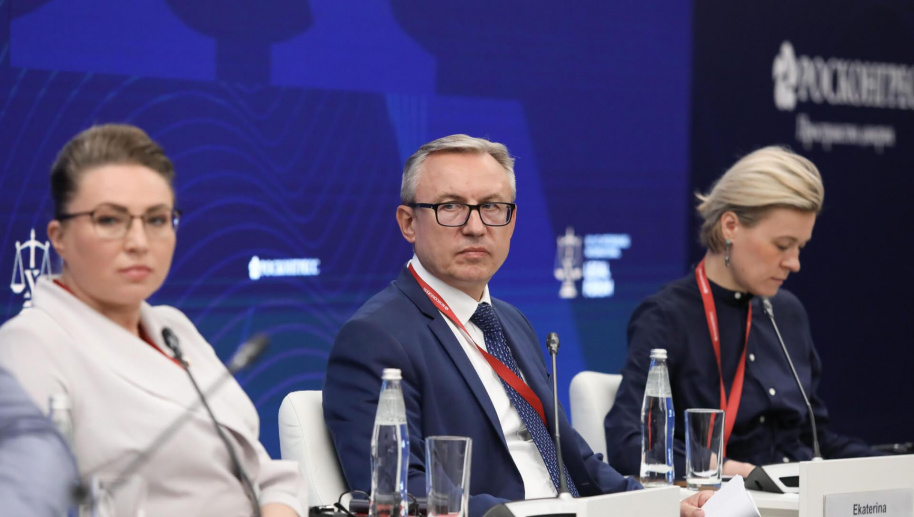
Ambassador-at-Large for Arctic Cooperation of the Ministry of Foreign Affairs of the Russian Federation Nikolay Korchunov: “Russia Is Building Its Policy in the Arctic Based on the Effective Use of Legal Instruments”

Russia’s domestic and foreign policy in the Arctic region can only be built on a solid foundation of legal instruments, Ambassador-at-Large for Arctic Cooperation of the Ministry of Foreign Affairs of the Russian Federation and Chair of the Senior Arctic Officials Nikolay Korchunov said during the session ‘The Legal Framework for the Development of the Arctic in the Context of Global Change’ at the 10th St. Petersburg International Legal Forum.
“Above all else, the Arctic is a territory of law. Russian policy in the region, both domestic and foreign, is based on a solid foundation of law. This is fundamentally important since this approach is a guarantee for ensuring Russian sovereignty, the rights and freedoms of people living in the Arctic, including Indigenous peoples, as well as the rights of investors who invest in international projects, among other things. We have no other choice but to build our policy based on the effective use of the relevant legal instruments,” he said.
Given the decision of the other seven Arctic countries to suspend the full-scale functioning of the Arctic Council, Russia is using this forced temporary pause to analyse the situation and work out additional steps to ensure its interests in the Arctic even more effectively, Korchunov said.
“The Russian Federation has never been held hostage to any formats of cooperation. Formats are important, but they are secondary to content. If they do not meet our interests, we draw the appropriate conclusions. As the largest Arctic country, we clearly shouldn’t put all our eggs in one basket. We are developing multi-faceted cooperation in various formats both with the states of the Arctic region and with non-Arctic countries. We are open to the formation of a broad international partnership for the sustainable development of the region,” he added.
One of the objectives of the Ministry for the Development of the Russian Far East and the Arctic is to build an investment climate in the region so that the social sector develops through the economy, said State Secretary and Deputy Minister for the Development of the Russian Far East and the Arctic Pavel Volkov. “Moving forward, first and foremost we need to build a management system that allows us to properly react to the challenges that exist in the regions, respond to them at the federal level, and promote development,” he said.
Volkov noted that the management system for the development of the Arctic includes a government commission, the Far East and Arctic Development Corporation, which manages all the special regimes in the Arctic zone, as well as other structures. In addition, the development tools that were created in the Far East have been improved and extended to the Arctic, and a special regime for supporting entrepreneurial activity has been introduced in the region.
State Secretary and MMC Norilsk Nickel Vice President Dmitry Pristanskov drew the attention of the session participants to two legal aspects of the Arctic’s development that must be taken into account when doing business in the region. He said it is crucial to take into account that the timeframe of investment cycles in the mining industry is 7–10 years and that the financing conditions, legislation, and demand for products may already be different by the time the facility is put into operation. Projects are also hampered by constant changes in tax and tariff legislation.
“Amidst the current heightened turbulence, tax stability is important to us. I would like to point out two things for targeted changes for business in the Arctic. The Tax Code of the Russian Federation states that a resident is not entitled to apply reduced corporate income tax rates for mining activities. But in addition to mining activities, we also carry out related types of economic management, which are unprofitable in the conditions of the Arctic. The business community is proposing changes that will allow businesses to apply tax breaks on the profits they earn from related activities, but also from downstream activities. Then we will not only stimulate the development of the raw material base, but also get into some deep processing,” Pristanskov said.
In addition, Pristanskov noted that the investment tax deduction mechanism, which is currently used to create social infrastructure facilities, has a number of conditions that make it difficult to apply in practice. Specifically, it only begins to work if a Russian region makes the n appropriate decision. But such steps are not profitable for the regions, he said.
“It’s much more efficient for the state to keep a social facility on the balance sheet of the investor who built it, while the investor bears the cost of maintaining it and receives a tax deduction amounting to a portion of investment in the facility and a portion of the cost of maintaining the facility,” Pristanskov said.
In her speech, Elena Shumilova, a member of the Federation Council’s Committee on Federal Structure, Regional Policy, Local Self-Government, and Northern Affairs, noted the importance of creating conditions for Arctic citizens to live a prosperous life, including various benefits and guarantees. “Relying on science, medicine, education, and deeper research, I believe that the human spirit should master the economy and bring it back to the people, not only for the development of the region, but also for the development of everyone living in these territories,” she said.
Russia is chairing the Arctic Council in 2021–2023. The comprehensive programme of Russia’s chairmanship involves promoting international cooperation in such priority areas as the population of the Arctic, including Indigenous peoples, environmental protection, socioeconomic development, as well as the bolstering of Arctic cooperation. The Roscongress Foundation is organizing the events of Russia’s Chairmanship of the Arctic Council.